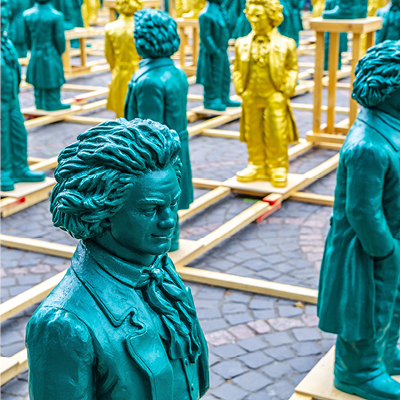[FR] Thinking about a united Europe with Beethoven

However universal the scope of their message, the great European artists of the 19th and 20th centuries are closely associated with the culture and spirit of a nation state. In the 19th century, this was the case for the leading French novelists, Balzac, Hugo, Flaubert and Zola, and for the Germans, whether Goethe or Schiller. In the 20th century, Proust presented himself as an essentially French novelist, and Musil and Schnitzer as Austrian writers. Stefan Zweig established himself as one of the first great European artists after spending his youth in Vienna, and he became European under the influence of historical traumas, the First World War and the rise of Nazism. The same was true in Germany for Thomas Mann and in France, to a lesser extent, for Romain Rolland. The same observation can be made about musicians: Schubert is Viennese, Schumann German, Berlioz French, Verdi Italian, Smetana Czech, Bartok Hungarian and Szymanowski Polish. The same picture could be painted for 20th-century composers. Having emigrated, some show national ambivalence, as did Goethe, for example, who was torn between Germany and Italy, albeit for other reasons.
In any case, if there is one artist who escapes any national polarisation, it is Beethoven. Apart from the timelessness and universality of his thinking, which still allows him to speak to the whole world today, he is the composer who should be designated as a symbol of European unity in its diversity.
It is therefore entirely appropriate and perfectly logical that the Ode to Joy from the Ninth Symphony was proposed as the European anthem in 1955, becoming official in 1985, without lyrics. There are many reasons for this, linked both to Beethoven’s personality, torn between contradictory tendencies, and to his conception of music, which incorporated elements of different kinds, all of which contributed to giving him the status of a great European capable of channelling the energies and thoughts of the entire European population in all its diversity and beyond any ideology. The following reflection addresses the main reasons for this, starting with the most external – his family background, his lifestyle, the historical context – and moving on to the most internal – the sensitive heart of his music.
Apart from the elements that most directly link Beethoven – the man and his work – to Europe, we will focus on the humanist values conveyed by his music, which are in harmony with the European project. This project aims in particular to strengthen peace between the peoples that make up the community, to promote mutual solidarity, to ensure respect for human dignity, to promote the diversity of each nation’s cultures, to defend the values of freedom, justice and tolerance, and their commitment to human rights, minority rights, etc. in which the European project, despite the distance in time, echoes Beethoven’s ideal of fraternity.




